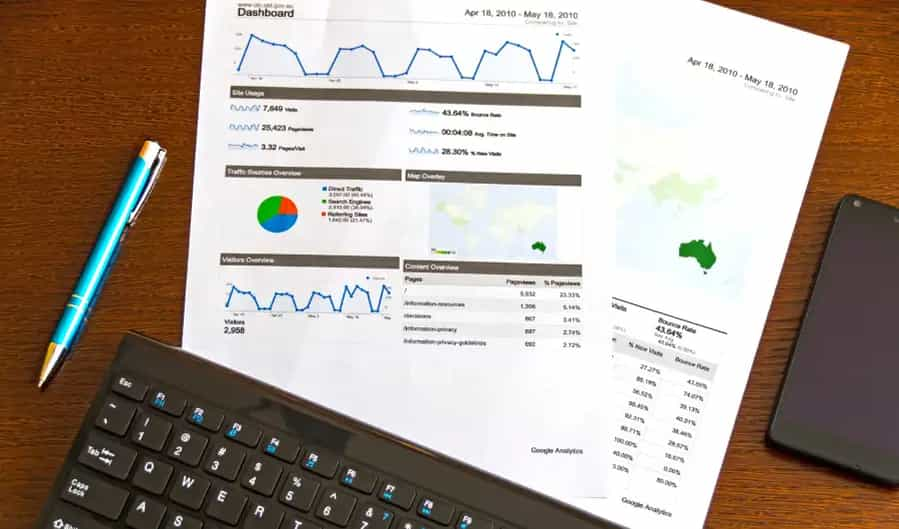
The importance of business reporting starts from day one, and evolves intricately throughout the business lifecycle.
The data within business reports acts as the foundation upon which you can build robust budgets, accurate forecasts, and strategic business plans.
But it's not just about numbers; it's about gaining a comprehensive insight into what has worked and what hasn't, allowing you to make informed projections and set realistic targets. Regular and insightful reporting enables you to keep a finger on the pulse of your business, identify trends, spot potential issues before they escalate, and seize opportunities as they arise.
Annual accounts are important, but limited
All businesses need to prepare annual accounts for year-end purposes, but these are prepared in a standard format, and don't necessarily provide bespoke information to really help drive the business forward.
- These annual accounts mainly serve to meet regulations and provide only a historical snapshot of financial performance over the past year. They may lack the granularity and real-time relevance that your business strategy needs.
- They are usually prepared months after the year's end, by which time you are well into the following year and the information is already out of date.
Annual accounts are essential, but may not offer sufficient business reporting to drive real business growth and enable informed, timely decisions.
How are management accounts different?
Unlike annual accounts, Management Accounts are prepared for internal use to support management decision-making. These business reports are typically generated monthly or quarterly, rather than annually.
Management accounts go beyond basic regulatory requirements, offering detailed and tailored information. This could be segmented analysis of different products, cash flow forecasts, and other key performance indicators (KPIs).
By focusing on real-time data and forward-looking metrics, management accounts help leaders to react to emerging trends, allocate resources more effectively, and implement corrective actions before small issues can become problems.
What should your business reporting include?
Effective business reporting is like having a clear window into your company's health. With this transparency, you can build trust with investors and lenders, make sound decisions based on real data, identify potential issues and opportunities early on, and ultimately use your resources more effectively to fuel your company's growth.
Keep the information fresh and frequent
Information needs to be received regularly and shortly after the period being reported on. Any report received is already containing historical data, but how fast you produce these reports will affect how quickly you can make changes and impact future periods.
Keep the information relevant
The information presented should be directly relevant to the specific needs and interests of the intended audience. This means tailoring reports for different stakeholders, such as focusing on financial performance for investors and operational details for department managers.
Accuracy is essential
The data and information included in the report must be reliable and trustworthy. This requires meticulous data collection, verification, and adherence to established accounting standards.
Reports must cater to business needs
For reports to be useful, they need to cater to the business needs. This should include financial and non-financial Key Performance Indicators (KPIs) as well as looking at trends in the data.
Trends can help you forward plan resources and highlight potential issues that may arise. Reporting can also highlight where the most and least profitable services, industries and/or clients are, so more informed decisions can be made moving forwards.
The management information can then be used to project future periods and look at the financial impact of potential opportunities and changes, having a direct financial benefit to the business.
Business reporting best practices
Use established accounting frameworks and reporting standards
Consistency and accuracy are paramount. Following established frameworks like Generally Accepted Accounting Principles (GAAP) ensures your reports are comparable across periods and adhere to industry best practices. This allows stakeholders to interpret your financial health with confidence.
Integrate business reporting with overall business strategy and objectives
Business reporting shouldn't exist in a silo. Align reports with your overall business goals and strategy. This means highlighting metrics that directly impact strategic objectives. For example, if a key objective is market expansion, reports should showcase sales growth in new territories.
Leverage technology to automate data collection and report generation
Manual data gathering and report creation can be time-consuming and error-prone. Utilise technology to streamline the process. Business intelligence tools can automate data collection from various sources, minimizing human error and saving valuable time. These tools can also generate reports with pre-defined templates and visualizations, ensuring consistency and efficiency.
Effectively communicate reports to stakeholders with clear explanations and visualisations
Don't just present a data dump. Clearly explain the findings within the report, highlighting key insights and trends. Utilise visuals like charts and graphs to enhance understanding, especially for complex data sets. Consider including a concise narrative summary that interprets the data and its implications for the business.
How to ensure your reports are right for you
Business reporting must be accurate, timely, and insightful. They must track KPI’s and trends that actually help you achieve your strategic goals and most importantly they must be easy to understand.
The right business reporting can transform a business for the better, and the Genus team are specialists in unlocking the full potential of your business data. If you need any help with your business reporting then contact our Genus team for a free discussion.

Alicia Williams
I am the Director of the Genus team at Shorts, a chartered certified accountant and Xero specialist. I specialise in cloud-based accounting solutions, particularly Xero and add-on software, helping clients streamline processes and improve efficiency. As a Client FD, I work closely with businesses to give them a clear understanding of their current position and support their long-term planning and growth.
View my articles